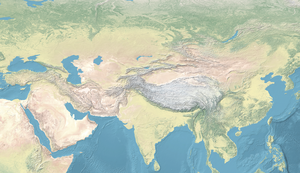Karluk_Yabgu_State
Karluk Yabghu
756–840 Karluk Turkic polity in Central Asia
The Karluk Yabghu State (simplified Chinese: 葛逻禄叶护国; traditional Chinese: 葛邏祿葉護國; pinyin: Géluólù Yèhùguó) was a polity ruled by Karluk tribes.
Karluk Yabghu State | |||||||||
|---|---|---|---|---|---|---|---|---|---|
| 756–840 | |||||||||
| Capital | Suyab later Balasagun | ||||||||
| Common languages | Karluk Turkic | ||||||||
| Religion | Tengriism | ||||||||
| Government | Monarchy | ||||||||
| History | |||||||||
• Established | 756 | ||||||||
• Disestablished | 840 | ||||||||
| |||||||||
| Today part of | China Kazakhstan Kyrgyzstan | ||||||||
The first information about the tribes of karluks that occupied the territory between Altai and the Eastern coast of Lake Balkhash dates back to the 5th century.[4] The Karluks were part of the First Turkic and Uyghur khaganates. They were composed of three tribes, therefore their ruler mostly called Sanxing Yabghu (Chinese: 三姓葉護; lit. 'Yabghu of Three Tribes') in 8th century.[5] In 742, they were named "Right Yabghu" by Basmyl khagan Ashina Shi. Like Basmyls, they were ruled by a branch of Ashina tribe.[6]
Karluk chief Bilge Yabghu Tun Apa Yigen Chor (Chinese: 毗伽葉護頓阿波移健啜; pinyin: Píjiā Yèhù Dùn ābō Yíjiàn Chuài) submitted to Uyghur khaganate in 746.[7] He may be same person as Yigen Chor (𐰘𐰃𐰏𐰤𐰲𐰆𐰺) mentioned in Kul-Chor stele.[8]
He was succeeded by Tun Bilge Yabghu (Chinese: 頓毗伽葉護; pinyin: Dùn Píjiā Yèhù) in 753.[7] A ruler of Karluks were mentioned in Turco-Manichean book "Sacred book of two fundamentals" (Iki Jïltïz Nom), fragments of which were found in 1907 at Kara-Khoja in the Turpan oasis by Albert von Le Coq. The book was dedicated to the ruler of the Chigil tribes, named Alp Burguchan, Alp Tarhan, Alp İl Tirgüg.[9] He probably was the one who conquered Turgesh state and resettled Karluks in Zhetysu basin, making Suyab their capital.[10]
Another ruler was Köbäk,[11] whose coins were found in modern Kyrgyzstan.[10]
When the Yenisei Kyrgyz destroyed the Uyghur Khaganate in 840, Karluk yabghu declared himself khagan with title Bilge Kul Qadir Khan, forming the Kara-Khanid Khanate.[12]
- Sims, Eleanor (2002). Peerless images : Persian painting and its sources. New Haven : Yale University Press. pp. 293–294. ISBN 978-0-300-09038-3.
- "Карлукское государство (756—940 гг.)". e-history.kz (in Russian). 2 August 2013. Retrieved 2023-08-31.
- Erkoç, Hayrettin İhsan (2008-10-23). Eski Türklerde Devlet Teşkilâtı (Gök Türk Dönemi) / State Organization of the Ancient Turks (The Türk Qaġanate Period) (Thesis).
- "Kul-Chur's Memorial Complex". bitig.org. Retrieved 2018-08-22.
- Salman, Hüseyin (Spring 2014). "The Issue of Qarluq State Establishment". Marmara Türkiyat Araştırmaları Dergisi. doi:10.16985/MTAD.201417912 (inactive 31 January 2024). Archived from the original on 22 August 2018. Retrieved 22 August 2018.
{{cite journal}}: CS1 maint: DOI inactive as of January 2024 (link) - "Zeno - Oriental Coins Database - Qarluq AE coin, unique recent finding". www.zeno.ru. Retrieved 2018-08-22.
- "Karluk Yabgu State (756-940)". 2 August 2013.
- Karamian, Gholamreza; Maksymiuk, Katarzyna (2017). Crowns, hats, turbans and helmets: the headgear in Iranian history. Siedlce Tehran: Institute of history and international relations, Faculty of Humanities, Siedlce University Department of archaeology and history, central Tehran branch, Tehran Azad University. p. 251, Fig. 37. ISBN 978-83-62447-19-0.
- History of civilisations of Central Asia. South Asia Books. March 1999. p. 569. ISBN 978-8120815407.
- The Cambridge History of Early Inner Asia (Vol 1). Cambridge University Press. p. 532. ISBN 978-0521243049.
This article related to Central Asian history is a stub. You can help Wikipedia by expanding it. |



